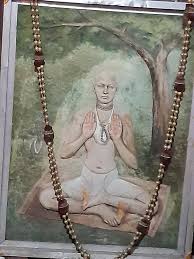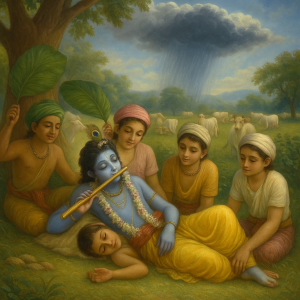The Miraculous Departure of Siddha Śrī Kṛṣṇadās Bābājī
On the night that Siddha Śrī Kṛṣṇadās Bābājī left his body in Ranvārī, an extraordinary event took place. Śrī Jagannāth Dās Bābājī and his disciple Bihārī were staying in a nearby cottage. As the night drew to a close, Śrī Jagannāth Dās Bābājī suddenly sensed something unusual and instructed Bihārī to check on Śrī Kṛṣṇadās Bābājī. When Bihārī reached the cottage, he found the door latched from the inside. Peering through a small opening, he saw Śrī Kṛṣṇadās Bābājī sitting cross-legged, with his body engulfed in flames. Astonishingly, despite the fire, Kṛṣṇadās Bābājī was calmly chanting the Holy Name, unaffected by the blaze.
The Divine Fire of Separation
Bihārī rushed back to report to Śrī Jagannāth Dās Bābājī, who exclaimed, “Oh! Virahānal, virahānal (the fire of separation)!” The Vrajavāsīs from the neighborhood gathered quickly and broke open the door. They witnessed the fire consuming Śrī Kṛṣṇadās Bābājī up to his throat, yet he continued chanting with unwavering focus. Despite the villagers’ concern, Śrī Kṛṣṇadās Bābājī raised his burning arms and blessed them, ensuring that no calamities would ever strike their village.
As the fire neared his throat, Śrī Jagannāth Dās Bābājī asked Bihārī to find some cotton, from which he made three wicks. He placed these wicks on Śrī Kṛṣṇadās Bābājī’s forehead, and with that, the fire reduced his entire body to ashes.
The Life of Śrī Kṛṣṇadās Bābājī
Śrī Kṛṣṇadās Bābājī, originally named Śrī Kṛṣṇa Prasād Chaṭṭopadhyay, was born in Mohammadpur, Bengal. As a young man, he left home to avoid an arranged marriage and journeyed to Vṛndāvan, where he dedicated himself to the service of Madanmohan jī at the Madanmohan Temple. Eventually, he settled in the forest of Ranvārī, where he lived a life of deep devotion and practiced bhajan.
The Dilemma of Pilgrimage
At the age of fifty, Śrī Kṛṣṇadās Bābājī felt the urge to visit the four main holy sites (tīrthas). However, Rādhārāṇī appeared to him in a dream, instructing him to remain in Vṛndāvan. Disregarding the dream, he embarked on his pilgrimage. Upon reaching Dvārakā, he received the tapta-mudrā, a ritual branding associated with the worship of Dvārakādhīśa (Kṛṣṇa as the King of Dvārakā). This act, though significant in Dvārakā worship, was not aligned with the rāgānugā-bhakti of Vraja, where the focus is on Kṛṣṇa’s sweet, intimate pastimes as a cowherd boy.
The Return to Vraj and Rādhārāṇī’s Directive
After receiving the tapta-mudrā, Śrī Kṛṣṇadās Bābājī found himself unable to continue his pilgrimage and returned to Vṛndāvan. That night, Rādhārāṇī appeared to him again, expressing her displeasure and instructing him to return to Dvārakā, as he was now associated with the mood of Satyabhāmā, Kṛṣṇa’s queen in Dvārakā. Distressed by this command, Śrī Kṛṣṇadās Bābājī sought guidance from other siddha mahātmās in Vraja, but they all advised him to follow Rādhārāṇī’s order.
The Final Fire of Separation
Heartbroken and filled with repentance, Śrī Kṛṣṇadās Bābājī confined himself to his cottage, consumed by the fire of separation from Rādhārāṇī. This internal fire manifested physically, eventually consuming his body entirely.
Legacy and Commemoration
After Śrī Kṛṣṇadās Bābājī’s body was reduced to ashes, his godbrother Śrī Premdās Bābājī performed the final rites. To this day, the Vrajavāsīs of Ranvārī commemorate his disappearance day with a grand festival, and the village remains protected from epidemics and famine, as per his blessings.
Lessons to Be Learned
This story illustrates the profound and intricate nature of devotion in Vraja. It teaches that the path of rāgānugā-bhakti, which focuses on the intimate pastimes of Rādhā and Kṛṣṇa, is distinct and must be followed with singular dedication. Mixing other forms of devotion, even those highly revered elsewhere, may hinder one’s spiritual progress in Vraja.
Quote from Shastra
“tadīyānāṁ samāhārād api bhaktyā praṇāśinām | ananya-cetaso bhaktir na śāntīr api sādhayet” — Bhakti-rasāmṛta-sindhu 1.2.260
“Even the purest devotion to the Lord cannot fully satisfy one who does not have exclusive devotion to Him alone.”
This verse emphasizes the importance of exclusive devotion and the dangers of allowing any other mood or focus to dilute one’s spiritual practice.
Prayer
Oh Rādhārāṇī, merciful Queen of Vṛndāvan, I humbly pray to You. Please guide me on the path of pure devotion and protect me from any distractions that may hinder my progress. Let my heart be fully absorbed in the sweetness of Your pastimes with Kṛṣṇa, and may I always remain in the shelter of Your lotus feet. Grant me the strength to follow Your instructions with unwavering faith and dedication. Jai Śrī Rādhā! Jai Śrī Kṛṣṇa!


